Objets Κέντρον Ερεύνης Ελληνικής Φιλοσοφίας
<< 10
10 >>
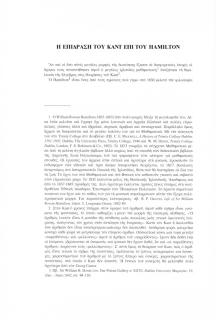
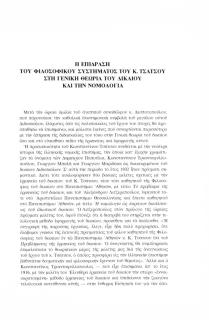
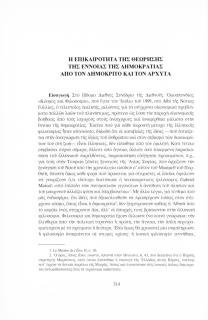
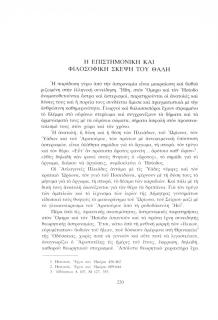
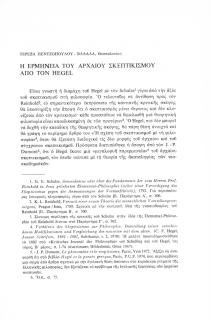
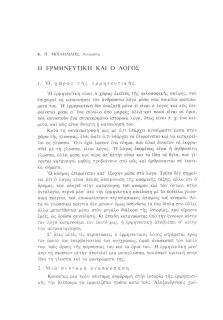
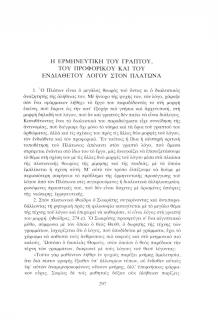
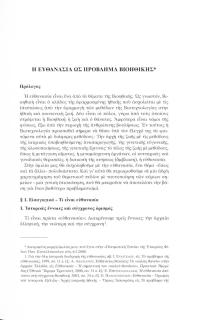
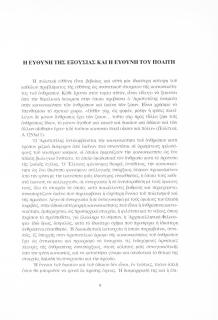
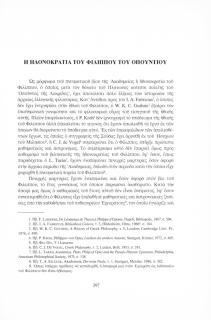
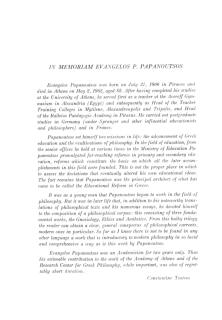
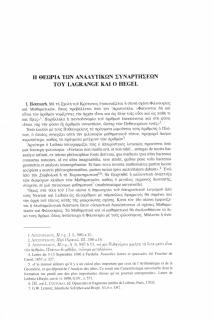 << 10
10 >>
<< 10
10 >>
Total: 4244

Η επίδραση του Καντ επί του Hamilton
Ενότητα: Άρθρα του περιοδικού "Φιλοσοφία"
Δεν υπάρχει περιγραφή
Η επίδραση του φιλοσοφικού συστήματος του Κ. Τσάτσου στη γενική θεωρία του δικαίου και την νομολογία
Ενότητα: Άρθρα του περιοδικού "Φιλοσοφία"
Δεν υπάρχει περιγραφή
Η επικαιρότητα της θεώρησης της έννοιας της δημοκρατίας από τον Δημόκριτο και τον Αρχύτα
Ενότητα: Άρθρα του περιοδικού "Φιλοσοφία"
S΄il est vrai que, dans un sens philosophique et non pas historique, le «miracle» grec ne consiste ni dans la conquête du savoir scientifique ni dans la collection des connaissances concernant le monde et l΄homme, mais dans les références des effets à leurs causes, son sens primordial est constitué par la constante de la philosophie grecque que la vérité n΄est ni un don des dieux ni prophétie ou «doxa», mais exploit de l΄homme de raison, interprétation rationnelle qui impose une attitude responsable dans la vie privée et la vie publique. Aussi, l΄actualité de la philosophie greque est-elle le fait que les problèmes que nous nous posons aujourd΄hui ont leurs racines, p. ex., dans la pensée des premiers penseurs de la Grèce; ceux-ci nous ont transmis les différents courants idéologiques qui nous conduisent à leurs œuvres. Comme l΄a très judicieusement remarqué Clémence Ramnoux (Pourquoi les Présocratiques, p. 397), l΄importance -et le charme— des Présocratiques réside dans le fait que «tous aujourd΄hui se sentent vivre dans une époque de tr...
Η επιστημονική και φιλοσοφική σκέψη του Θαλή
Ενότητα: Άρθρα του περιοδικού "Φιλοσοφία"
Leader of the ancient greek mathematicians and founder of theoretic geometry, the porisms of which he applies to near and remote reality (as engineer and astronomer respectively), with his innovating method to combine mathematics with physics for the explanation of phenomena, Thales of Miletus is the first, according to tradition, who enters the field of «Physiologia», becoming thus not only the first natural philosopher, as usually considered, but also the example for both the platonic dialectician and the aristotelian sage, who possesses the «Καθ΄ όλου έπιστήμην» and seeks the First Principles and Causes. The vital property of his first principle, the water —which is also the first ontological principle in the history of philosophy— to create life and animate everything, is the main reason for characterising the philosophy of which Thales is the leader as hylozoistic philosophy.
Η ερμηνεία του αρχαίου Σκεπτικισμού από τον Hegel
Ενότητα: Άρθρα του περιοδικού "Φιλοσοφία"
L’importance que Hegel accorde au mouvement de pensée philosophique inauguré par les sceptiques grecs est un fait incontestable dont témoignent les longs développements qu’il lui consacre dans ses Leçons sur l’Histoire de la Philosophie. La confrontation du dogmatisme et du scepticisme dans l’Antiquité fournit, d’ailleurs à Hegel l’occasion d’y voir un exemple illustrant de façon concrète la marche dialectique de l’esprit. A maintes reprises Hegel souligne en effet la haute conscience dont ces philosophes ont fait preuve dans leur recherche du fondement du savoir. On rencontre un point du vue analogue dans son étude La relation du scepticisme avec la philosophie. Cependant, Hegel manifeste une préférence marquée pour les Nouveaux Académiciens plutôt que pour les pyrrhoniens. La pensée d’Aenésidème paraît ainsi reléguée au second plan. D’autre part, l’on connaît la polémique de Hegel contre cet aspect du scepticisme moderne représenté, à son temps, par Schulze, Professeur de philosophie à Helmstedt et à son temps, par Schulze, Professeur d...
Η ερμηνευτική και ο λόγος.
Ενότητα: Άρθρα του περιοδικού "Φιλοσοφία"
Die Hermeneutik ist eine Theorie des menschlichen Logos in seinen vielfältigen Erscheinungen. Aufgabe der Hermeneutik ist den Logos nicht nur als ein allgemeines Kommunikationssystem sondern vor allem als etwas individuell wirkendes in seiner geschichtlichen Konkretheit zu verstehen. Die Welt wird im Logos nicht einfach als eine Ordnung abgebildet; sondern der Kosmos selbst wird im Logos sprachlich verwirklicht. In diesem Sinn führt die Hermeneutik zu einem Welt- und Selbstverständnis. Ursprünglich wächst der Logos als ein Dialog mit den anderen und mit uns selbst. Dieser Dialog ist der existenzielle Raum in dem wir einander und die Wirklichkeit verstehen. Jeder existenziell und pragmatisch sich entfaltende Logos ist dem Verstehen und dem Missverstehen ausgesetzt; Frage und Antwort bringt den Logos In-die-Schwebe. Dem Logos als potenzielles System von Regeln und Strukturen steht die individualisierte Rede als ein Spiel mit veschwommenem Rahmen gegenüber. Der Sinn der individualisierten, schöpferischen Rede sprengt den Rahmen der fixierte...
Η ερμηνευτική του γραπτού, του προφορικού και του ενδιάθετου λόγου στον Πλάτωνα
Ενότητα: Άρθρα του περιοδικού "Φιλοσοφία"
Im platonischen Phaidros behandelt Sokrates das große Thema der Kunst der Reden und insbesondere die Rede in ihrer schriftlichen Form. Die schriftliche Rede ist, nach Sokrates: (a) eine entfremdete, in Zeichen gebundene Rede, ein Abbild der lebendigen Rede, (b) sie bietet keinen Zugang zur Wahrheit sondern bleibt im Schein verfangen, (c) sie ist monologisch und unpersönlich und (d) sie ist starr und der Missdeutung ausgeliefert. Im Gegensatz dazu ist die mündliche Rede: (a) eine echte, urspüngliche Rede, (b) sie ist beselt und lebendig, (c) als Dialog ist sie eine in Frage und Antwort sich bewegende, selbst verteitigende und unter Personen sich entfaltende, fruchtbare Rede, und (d) sie zielt auf die dialektische Zusammenschau und ihre diairetische Unterscheidung und insofern hat sie eine ontologische und anthropognostische Relevanz. Es gibt aber bei Piaton eine dritte Form der Rede (Siebter Brief, 341 c-e), die innerliche, die «aus langem Zusammenleben» im tiefsten der Seele entsteht, und «nährt sich von nun an selber. «Sie ist eine Rede...
Η ευθανασία ως πρόβλημα βιοηθικής
Ενότητα: Άρθρα του περιοδικού "Φιλοσοφία"
§ 1. Was ist Euthanasie? Man unterscheidet drei Hauptbegriffe: den altgriechischen, den neuzeitlichen und den heutigen Begriff. Im Altgriechischen bedeutet das Wort Euthanasie grundsätzlich den "guten Tod" (et) Oaveiv), gleichgültig aus welchem Grund. Zu Beginn des 17. Jahrhunderts hat Francis Bacon den Begriff Euthanasie zum ersten Mal in die medizinische Terminologie eingeführt. Er unterschied zwischen einer "Euthanasie interior", die sich mit der Vorbereitung der Seele auf den Tod befasst, und einer "Euthanasie", in der ärtliche Handlungen betrieben werden, die geeignet sind, die Quellen im Todeskampf zu mildern. Im 20. Jahrhundert ändert sich wieder der Begriff der Euthanasie: er wird von der Vorstellung einer psychischen Vorbereitung auf den Tod endgültig losgelöst und mit der Herbeiführung eines unnatürlichen Todes in Verbindung gebracht. Als Euthanasie meint man nunmehr hauptsächlich die gezielte schmerzlose Tötung oder Beschleunigung des Todeseintritts aus leid- und erbarmungsvollen Gefühlen, ohne dass der Patient seine Todesbeschl...
Η ευθύνη της εξουσίας και η ευθύνη του πολίτη
Ενότητα: Άρθρα του περιοδικού "Φιλοσοφία"
L΄ idée de responsabilité politique est en quelque sorte inhérante à toute communauté politique, conformément avec la notion de sociabilité, telle qu΄Aristote l΄a définie très judicieusement, il y a plus de deux mille ans. En fait, cette idée se heurte dans la pratique à des multiples difficultés sinon à des obstacles insurmontables. Dans les régimes autarchiques, à commencer par la monarchie absolue, la responsabilité politique devient inopérante, tout en étant inhérente à l΄idée du pouvoir comme garant du Bien Commun. Dans les régimes démocratiques, la responsabilité est transférée in globo au peuple souverain. Cependant, dans la mesure où, avec l΄entremise du principe représentatif et le «centralisme démocratique» de l΄état-nation le pouvoir est concédé aux représentants et s΄identifie en fait avec la souveraineté étatique. Le problème de la responsabilité politique se trouve être cantoné dans l΄espace des pouvoirs constitués de l΄État et se présente désormais sous la forme d΄une problématique toujours controversée des forces politiques...
Η ηδονοκρατία του Φιλίππου του Οπούντιου
Ενότητα: Άρθρα του περιοδικού "Φιλοσοφία"
According to the author of Suda, who drew his material from Hesychius of Miletus, Philippus of Opus became a well educated associate of Plato and wrote on a wide variety of philosophical topics. By combining the list of his works presented by the author of Suda with his fragments collected by F. Lasserre we attempt to resolve some problems related to the hedonistic conceptions attributed to the philosopher of Opus. While considering this viewpoint, one observes such a distinction between spiritual pleasures and those of the flesh that it suggests, in some way, the existence of a hierarchy and measures the authenticity and importance of moral character. It may be worth adding that a survey of Plutarchus’ statements concerning the philosopher of Opus is also important for understanding the thought of Plutarchus himself.
Η ηθική φιλοσοφία του Επίκτητου
Ενότητα: Άρθρα του περιοδικού "Φιλοσοφία"
Δεν υπάρχει περιγραφή

